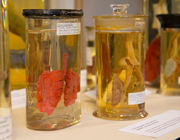Schools and teachers: Key Stage 4
This session offers students the opportunity to handle Museum specimens and take part in a range of object-based activities involving group-work and discussion.
In addition to the workshop below we are happy to tailor sessions for your students and curriculum needs including Religious Studies . Please contact us on education@oum.ox.ac.uk
Sessions can be combined with a visit to the Botanic Garden or the Museum of the History of Science

Natural History Investigators
Each year the Museum runs a club for KS4 students. Investigators interested in the natural world have an opportunity to pursue an extended project of their choice. Investigators meet on Saturdays from 10.30am to 12.30pm for 10 weeks. Investigators have access to special Museum objects and experts in the field. Investigators can submit their work for a British Science Association CREST award.
For more information about the next course and an application form contact education@oum.ox.ac.uk
Our Place in Evolution
Why was Darwin such a famous and controversial figure? Museum specimens are used to tell Darwin’s story and explain the strength of his ideas. Students have an opportunity to handle replica skulls of early human ancestors and figure out how we use different types of scientific evidence to fill in the gaps of our own evolution story. ‘Our Place in Evolution’ teacher sheet
Online resources: learning more
- The Oxford dodo
The dodo is one of the most famous examples of extinction; discover its story and its contribution to science. - Rocks from space
The Earth and beyond. - Rocks in the Museum
Students can study the rocks on display in the Museum, the three different rock types, and plate tectonics. - Browse learning more
Learning more provides a series of articles for older students on the history and science relating to the Museum.
Learning more articles are PDF format and are usually 500kB or less in size.
To read these files you will need to download Adobe Reader
Online resources: in the learning zone
- Classifying animals
'Animal I.D.' provides an introduction to animal classification with a series of sorting games. - Extinct and endangered animals
Students can use these resources for their own research and explore how animals become extinct and endangered. - Browse the learning zone
The learning zone provides a range of different articles for younger students on science topics linked to the national curriculum.
Online resources: image banks
- Grouping animals
Challenges students to classify animals; can they identify birds, mammals, reptiles, amphibians, fish and invertebrates? - The human skeleton
Can students identify the bones of the human body? This series of photographs provides a useful resource in the classroom. - Rock types
A photographic introduction to igneous, sedimentary and metamorphic rocks; sort them and discuss the processes that form each type of rock.
The image banks are PDF format and are all 800kB or less in size.
To read these files you will need to download Adobe Reader
